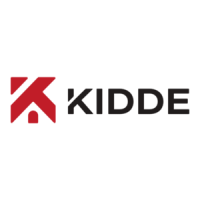Additional Recommendations
The National Fire Protection Association’s Standard 72 provides the
following information:
Smoke Detection. Where required by applicable laws, codes, or standards
for the specified occupancy, approved single- and multiple-station smoke
alarms shall be installed as follows: (1) In all sleeping rooms Exception:
Smoke alarms shall not be required in sleeping rooms in existing one-
and two-family dwelling units. (2) Outside of each separate sleeping
area, in immediate vicinity of the sleeping rooms. (3) On each level of
the dwelling unit, including basements Exception: In existing one- and
two-family dwelling units, approved smoke alarms powered by batteries
are permitted.
Smoke Detection - Are More Smoke Alarms Desirable?
Required number of smoke alarms (as shown in Image 1A and Image
1B): The required number of smoke alarms might not provide reliable
early warning protection for those areas separated by a door from the
areas protected by the required smoke alarms. For this reason, it is
recommended that the householder consider the use of additional smoke
alarms for those areas for increased protection.
The additional areas include the basement, bedrooms, dining room,
furnace room, utility room, and hallways not protected by the required
smoke alarms. The installation of the smoke alarms in the kitchen, attic
(finished or unfinished), or garage is normally not recommended, as
these locations occasionally experience conditions that can result in
improper operation.
Alarms should be installed in accordance with the National Fire Protection
Association’s Standard 72 (NFPA, Batterymarch Park, Quincy, MA 02269).
Notify your local fire department and insurance company of your smoke
alarm installation.
5. Fire Safety

